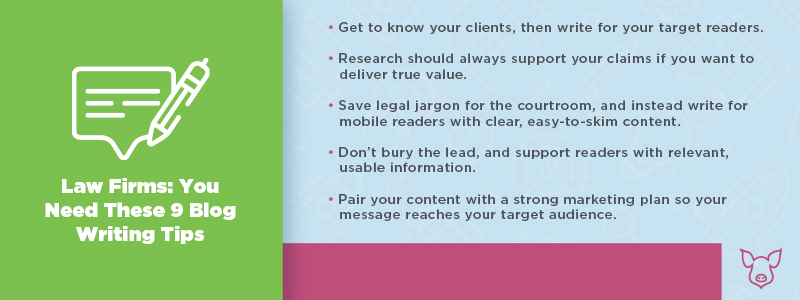Every industry has unique content needs, and law firms are no exception. They require professional, compassionate, well-written, and valuable blog posts. Here’s how to make that happen.

Lawyers have unique needs when it comes to content. Your law firm’s voice must represent its values, after all, and clients are usually looking for professional, well-written information about you and your services. You still need to employ best practices like SEO tactics to make sure you get noticed, though. Your competitors are putting out their own legal content, too, so you have to stand out and show how you’re different.
There’s no need to panic! Following a few steps could be the difference between mediocre copy that gets lost in the fray and engaging your audience in new and exciting ways. Here are nine blog writing tips for law firms you should put to work now.
1. Get to know your clients
The first and most important tip is to know who you’re talking to. Even the best copy won’t get you anywhere if it’s not targeted to the groups you’re trying to reach. This is going to take some research on your part. Find out where clients find legal help. Which social media platforms do they love? What tops their lists of concerns when they’re looking for a lawyer? Monitor social networks, look at competing websites, read online client reviews, send out surveys for feedback, and just pay attention. Listen closely to what prospective clients are asking you. If their first question is always price, maybe it’s time to incorporate your fee structure into your blog posts and other copy.
2. Write for the reader
It can be really tempting to write for search engines and SEO, keyword packing your articles and obsessively checking where your post appears on the search engine results page. The truth is that your clients will notice when you do this. They won’t feel like you’re really trying to talk to them if your copy feels like it was written to please a bot and get ranked highly. Instead, take a more genuine approach and focus on what your audience cares about. Write with a real desire to teach them something.
3. Bring in stats
Whether you’re posting news or taking a stance on a legal trend, using research and fact-based claims shows you’re a credible source. Citing stats and reports helps you establish authority. You’re not just making baseless statements, but using real studies to create your conclusions. This is a crucial process for those writing in the legal realm.
4. Deliver value
Similarly, use all that research to give your readers something of value, like a clear takeaway or unique perspective. Clients want to see that you’re staying up on what’s happening in the industry and using your expertise and experience to form your own thoughts and opinions on pressing topics.
5. Save the legal jargon for the courtroom
Your online readers will move along to the next law firm or blog post if they have no clue what you’re talking about. Make sure you’re writing for the average layperson (unless a post is specifically directed at other legal professionals). People want answers to something that’s concerning them when they’re looking for a lawyer or basic legal information. They don’t want to read legal jargon.
6. Write for a mobile reader
Not all your prospective clients will be reading your blog on a smartphone, but many will. You need to ensure your formatting is just right, and sometimes that means making your content skimmable. Here are a few pointers:
- Break up lengthy paragraphs.
- Use bulleted and numbered lists.
- Incorporate images or video.
- Preview how your post looks on a mobile device before you publish.
- Use headlines and subheads to separate sections.
Today’s legal clients want to read easily digestible content, especially when they’re mobile.
7. Don’t bury the lead
You want your readers to make it to the end of your post, but many of them won’t – and that’s OK. Accommodate these visitors by including your most important bit of information at the beginning, or by at least letting them know what they’ll learn from reading your blog. They probably won’t spend the time on it if it’s not clear what they’ll actually get out of it, after all, even if you have a really good piece of advice at the end. Don’t make your readers work to get the juicy info you want to share with them.
8. Show empathy
Legal clients are most likely going through something hard, so show your support in your content. Be professional, but think about how you can be helpful, too. Write posts that focus on the issues they’re dealing with. If your firm handles divorce cases, for example, include information about how people can handle the hard emotions that come with that transition. Showing compassion humanizes your law firm and makes your content more meaningful to your audience.
9. Pair your content with a strong marketing plan
You need to balance being genuine, compassionate, and authoritative to both show support for and pull in your readers. Your content plan is more than just words on digital pages, though. It’s a piece of a marketing puzzle that can help you get new leads and paying clients. Pair your blog with your overall inbound marketing strategy and SEO tactics. Use a consistent tone across your channels, and include keywords when they make sense. Post your new blogs on your social media channels to drive traffic back to your site, plus link to them in your email newsletters. Understanding that your marketing components work together will help you write blog posts that are relevant and accurately represent your law firm.
Need help with your law firm blog?
It can be difficult to follow these best practices if you don’t have the time or resources. That’s why ContentBacon is here, to deliver exceptional, custom content that can transform your marketing efforts. Our expert marketers, strategists, and content creators help you with your blog, website, social media, email newsletter, and more, plus help you track key marketing analytics so you can pivot as needed.
Reach out to the ContentBacon team today to get started with a better content marketing plan.
How's your current content plan?
We're offering a no strings attached content assessment. Have our experts provide you a free evaluation of your content plan and we'll provide you some free strategy on how to optimize. On the house (really).

